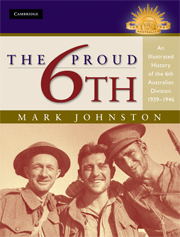Book contents
- Frontmatter
- Epigraph
- Contents
- List of Maps
- Acknowledgements
- Conventions and Abbreviations
- Introduction
- 1 Origins and Early Days
- 2 Bardia
- 3 Tobruk to Benghazi
- 4 Greece
- 5 Crete
- 6 Syria
- 7 Return to Australia
- 8 Kokoda to the Sea
- 9 Wau-Salamaua
- 10 The Longest Wait: Australia 1943–4
- 11 Aitape–Wewak
- 12 Conclusion
- Appendix 1 6th Division Casualties
- Appendix 2 6th Division Honours and Awards
- Notes
- Bibliography
- Index
1 - Origins and Early Days
Published online by Cambridge University Press: 05 February 2015
- Frontmatter
- Epigraph
- Contents
- List of Maps
- Acknowledgements
- Conventions and Abbreviations
- Introduction
- 1 Origins and Early Days
- 2 Bardia
- 3 Tobruk to Benghazi
- 4 Greece
- 5 Crete
- 6 Syria
- 7 Return to Australia
- 8 Kokoda to the Sea
- 9 Wau-Salamaua
- 10 The Longest Wait: Australia 1943–4
- 11 Aitape–Wewak
- 12 Conclusion
- Appendix 1 6th Division Casualties
- Appendix 2 6th Division Honours and Awards
- Notes
- Bibliography
- Index
Summary
The story of the 6th Division's origins is the story of the founding of the Second Australian Imperial Force, for the division was the first raised for World War II.
Twelve days after Australia followed Britain into war against Germany on 3 September 1939 the government decided to raise a division for overseas service. Lack of equipment, hesitation about the value of land forces in modern warfare, Labor party opposition, fear of Japanese intentions and uncertainty about the length of the coming European war all delayed the decision. However, on 15 September 1939, Prime Minister Robert Menzies announced in a radio broadcast that a new Australian infantry division would be created to serve at home or abroad. The division would be the nucleus of a 20000-man special force, to be called the Second Australian Imperial Force, or AIF. Australia already had a militia of 80000 men who had volunteered for home defence and a regular force of about 2800. Half of the 20000 vacancies in the new special force were allotted to the militia, but only about 5000 volunteers came forward from that source. Most of the remaining volunteers had no military experience.
Because five militia infantry divisions already existed in Australia, the new division was named the 6th Division. It was, however, the first division of its kind raised for World War II. Inevitably, World War I and especially the First AIF loomed large in the minds of politicians and soldiers of all ranks as the new force was organised. For example, the first entry in the war diary of one of the division's three infantry brigades says:
Today the years between the demobilisation of the famous 1st. A.I.F. and the formation of the 2nd were bridged when Bde Cmdrs and Bde Majors attended a Divisional conference at Army H.Q., Victoria Barracks, St. Kilda Rd.
- Type
- Chapter
- Information
- The Proud 6thAn Illustrated History of the 6th Australian Division 1939–1946, pp. 7 - 25Publisher: Cambridge University PressPrint publication year: 2008

